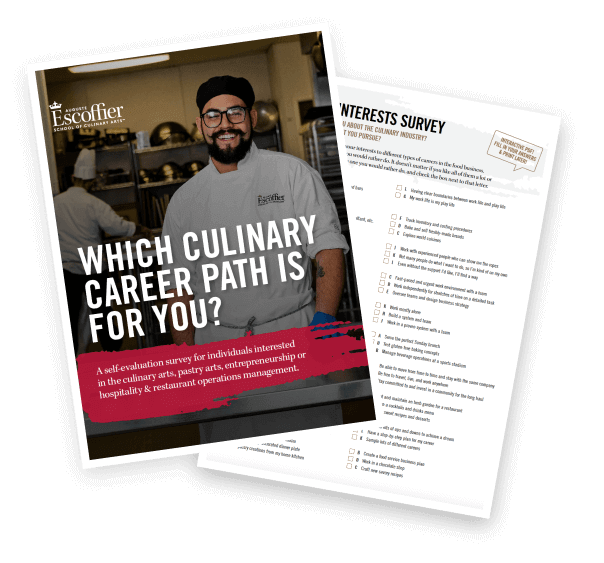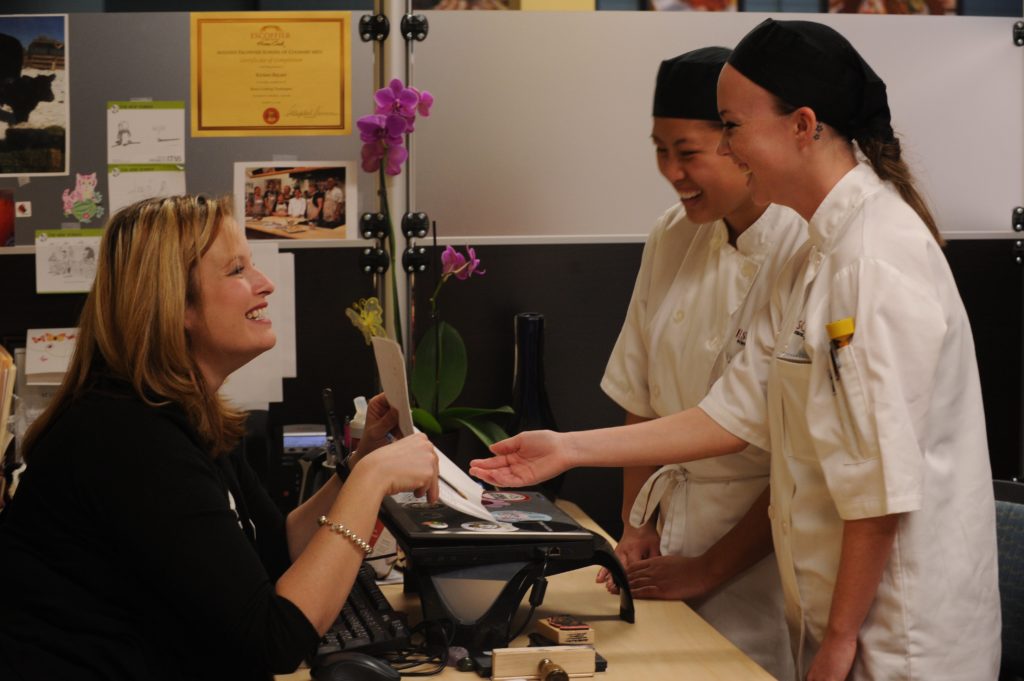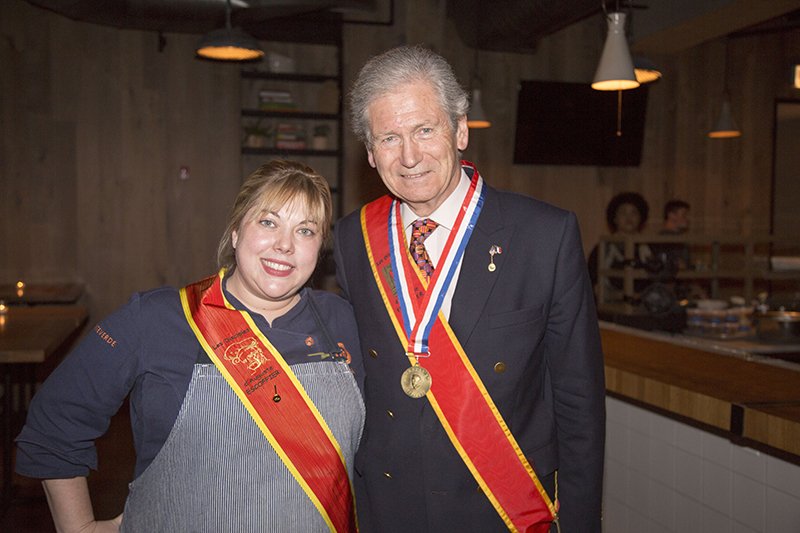So you want to start your culinary career with a job in a professional kitchen?
A successful career as a chef takes both patience and dedication to the craft. Although finding your first job in a professional kitchen and continuing to build a culinary career can seem like a daunting task, taking advantage of the resources available to you can help you reach your goals.
Here are some tips for finding a job and building your career in a professional kitchen.
Focus on a Balanced Culinary Education
It’s important to be prepared before you begin actively searching for a job in a professional kitchen, and culinary school can give you the leg up you need.
Culinary school graduates can bring a diverse set of skills to employers, such as knowledge of business operations, management, and customer experience enhancement. These skills are especially important now as restaurants are adapting to changing trends in consumer behavior and planning their financial recovery amid the COVID-19 pandemic.
On the other hand, those without a formal culinary education often only have experience in a single aspect of the foodservice industry – which could limit their career options. According to Omni Hotels & Resorts Executive Chef Josh Hasho, a formal culinary education can be a gold star on your resume.
Celebrity Chef and Restaurateur Curtis Duffy explains that a balanced education includes an understanding of the fundamentals of cooking methods, and also business skills such as “marketing strategy, cost analysis, how to break down numbers, understanding spreadsheets, and how money comes and goes.”
Career advice from Celebrity Chef and Restaurateur Curtis Duffy
Consider a culinary education with an emphasis on directly transferable skills such as kitchen operations and management. Not only can this help you with finding your first job, but it may also serve you as you advance in your career and become responsible for overseeing more people in the kitchen.
Get an Externship in a Professional Kitchen
An industry externship is a great way to get hands-on training in a professional kitchen – and possibly secure your first job by the end of it.
Auguste Escoffier School of Culinary Arts’ curriculum requires students to participate in externships where they have the opportunity to work with a mentor and apply their skills in professional kitchens with some of the top employers in the food industry. Online students are also required to complete an externship in a kitchen near where they live.
One of the best parts about Auguste Escoffier School of Culinary Arts is they help you along the way to find externships….I went in and talked to the Sous Chef and then started going in two days a week to learn prior to my externship. At the end of my externship, my Sous Chef said that if I gave him a few weeks, he could probably get me a job. You have to be patient in small kitchens, and you have to let them know how you feel too.”
John Hadala, Culinary Arts Graduate & Line Cook at Il Posto
There is simply no substitute for real world experience. Omni Hotels & Resorts Executive Chef Josh Hasho says “If somebody goes to culinary school, it shows extra commitment and follow through…it’s a ‘gold star’ on their resume.”
A culinary education that includes in-demand skills and an industry externship can potentially set you apart in your job search from candidates who haven’t received formal training and hands-on experience in the real world.
As chefs move up in their career, their responsibilities involve more than just making amazing food. Depending on the type of externship, you may gain first-hand training in enhancing customer experience, menu & facility design, and how to make front of house and back of house operations more efficient – all important skills if you are interested in continuing to build your career.
This is especially important in the current context, as many restaurants are looking to hire people who can fulfill multiple roles as they reopen post-COVID-19.

Take the Culinary Career Survey
We’ve compiled a checklist of all of the essential questions into one handy tool: career options, culinary interest surveys, educational opportunities, and more.
Work Your Way Up
For someone new to the industry, it’s rare that anyone leaving culinary school jumps straight to a high-paying job as an executive or sous chef. Your first job in a professional kitchen may be as a roundsman, catering assistant, prep or line cook. These jobs provide a major opportunity to master your craft.
This is also a chance to observe how experienced cooks and chefs organize their stations, assemble their dishes, and learn to communicate and cooperate with the kitchen team.
Even if you have practiced your knife skills and learned the basics of many cuisines in culinary school, being put through your paces on a daily basis is a different kind of training. Under the pressure of a professional kitchen, your abilities will be tested and will help you to learn quickly.
What Omni Hotels & Resorts Executive Chef Josh Hasho looks for when hiring culinary students
According to Chef Marc Vetri of Philadelphia’s Vetre Ristorante, knowing the fundamentals and being able to work well with the rest of the kitchen staff are the keys to getting hired and succeeding in a kitchen. For young chefs just starting out, they might consider choosing a job where they can receive the most beneficial experience and not necessarily the highest wages.
By focusing on mastering foundational culinary skills and learning from mentors early on, you can give yourself a competitive advantage for positions at top-tier restaurants.
Utilize Your Institution’s Career Services
One of the advantages of a formal culinary education at an institution like Escoffier is that students receive career assistance while in school and support after graduation.
The Career Services staff provide a wide range of services to prepare current students and graduates to build a successful career, including resume writing assistance, job application and interview preparation, industry referrals, networking opportunities, and job listings.
The first step the staff takes is to help students figure out their culinary career goals. Are you looking for steady 9-5 work hours? Fine-dining establishments? Cruise ships? Luxury retirement homes?
Career Services representatives start the conversation about externships early on, so they can help students select the right externship to support those goals. They then offer tailored coaching to students through the externship to graduation and beyond.

Escoffier’s Career Services department is broken up regionally across the United States. Students are assigned to a representative who is most familiar with the local job market. Students are also matched based on programs — Culinary Arts vs. Pastry Arts, Degree vs. Diploma — so your representative will be assigned based on your program and regional location.
“In January of 2016, I decided I wanted to become a chef on a Disney cruise line. I came to the realization that you have to have a degree in culinary arts to achieve that. I decided to attend school at Auguste Escoffier School of Culinary Arts and, little did I know, this school would set me up to work with Disney. Escoffier has set me up to reach for my dreams and, thanks to Career Services, I have accepted an internship with The Disney Culinary Program. It has definitely been a true blessing.”
Jane Dodson, Culinary Arts Graduate
The team at Escoffier can help you prepare for your first job…and your next job…and the one after that.
Create a Widespread Network
The old adage of “it’s who you know” that determines career progress is still relevant today.
People primarily do business and hire people they know and trust – which is why having a helpful network of others in the industry is so important. A strong network not only offers career opportunities, but is also a useful resource for mentorship and learning.
One of the benefits of attending culinary school at Escoffier is the chance to connect with a vast network of Chef Instructors who are some of the leaders in their field. The culture of open communication and feedback allows you to build professional relationships with instructors and acquire mentorship.
Culinary school is also a place to meet fellow culinarians who could end up being a job referral. Once students graduate, they can join the Escoffier Alumni Association where they connect with fellow colleagues, network with industry professionals, and get access to featured job opportunities to continue building their careers in professional kitchens.
There are also a variety of culinary conventions and organizations where you can meet and network with other culinary professionals.
The Disciples Escoffier International is a gastronomic society that organizes culinary events where members gather to discuss French haute cuisine, as well as works to unite all Disciples Escoffier from around the world. Michel Escoffier, the great-grandson of our school’s namesake, Auguste Escoffier, is also the Hereditary Honorary President of Disciples Escoffier International Association.

Chef Sarah Grueneberg with Michel Escoffier, the great-grandson of Auguste Escoffier
Other organizations such as the National Restaurant Association provides industry news and helps restaurant professionals obtain their culinary goals, while the International Association of Culinary Professionals facilitates the collaboration and communication of those in the culinary industry.
Knowing other people in the industry and staying on top of the latest culinary trends can make a huge difference in getting your first job and advancing your professional goals.
You never know when meeting the right person could lead to the start of a dream career.
Career Success Starts With You
Ultimately, where you start and how far you go in your culinary or pastry career will be determined by the effort and drive you take to create an attractive profile for employers.
If you are considering entering the culinary profession, schools like Escoffier strive to offer some of the best networking opportunities and potential for career growth. We work with dozens of employers to help match students with industry externships and to provide career assistance to our graduates.
Contact our Admissions department and speak to an advisor today to learn more.
Did you enjoy this article? You may want to check out these as well.
- Networking Tips for Aspiring Chefs
- Culinary School Graduates Will Require New Skills Post-COVID-19
- 3 Ways Culinary School Can Boost Your Career
This article was originally published on December 11, 2015, but has since been updated.

 One of the best parts about Auguste Escoffier School of Culinary Arts is they help you along the way to find externships….I went in and talked to the Sous Chef and then started going in two days a week to learn prior to my externship. At the end of my externship, my Sous Chef said that if I gave him a few weeks, he could probably get me a job. You have to be patient in small kitchens, and you have to let them know how you feel too.”
One of the best parts about Auguste Escoffier School of Culinary Arts is they help you along the way to find externships….I went in and talked to the Sous Chef and then started going in two days a week to learn prior to my externship. At the end of my externship, my Sous Chef said that if I gave him a few weeks, he could probably get me a job. You have to be patient in small kitchens, and you have to let them know how you feel too.” “In January of 2016, I decided I wanted to become a chef on a Disney cruise line. I came to the realization that you have to have a degree in culinary arts to achieve that. I decided to attend school at Auguste Escoffier School of Culinary Arts and, little did I know, this school would set me up to work with Disney. Escoffier has set me up to reach for my dreams and, thanks to Career Services, I have accepted an internship with The Disney Culinary Program. It has definitely been a true blessing.”
“In January of 2016, I decided I wanted to become a chef on a Disney cruise line. I came to the realization that you have to have a degree in culinary arts to achieve that. I decided to attend school at Auguste Escoffier School of Culinary Arts and, little did I know, this school would set me up to work with Disney. Escoffier has set me up to reach for my dreams and, thanks to Career Services, I have accepted an internship with The Disney Culinary Program. It has definitely been a true blessing.”

